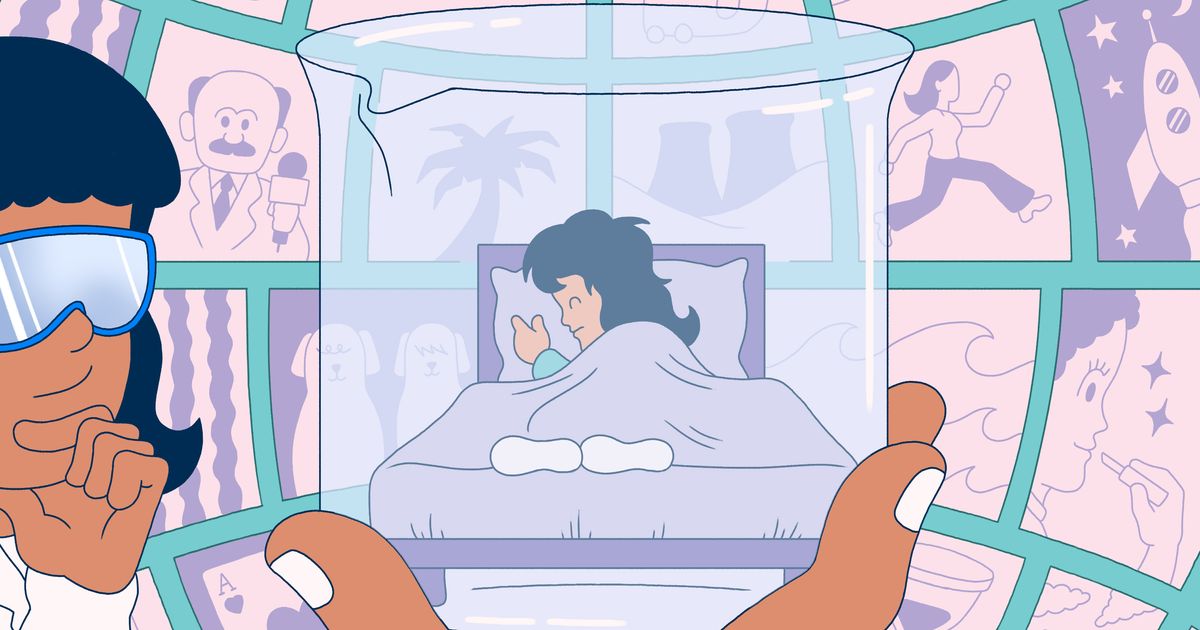The Truth About Falling Asleep to Screens
Conceitos Básicos
The author explores the controversial topic of falling asleep to screens, challenging traditional beliefs and presenting new research findings that suggest a different perspective on the issue.
Resumo
Falling asleep to screens is a common practice despite warnings about its negative effects. The article delves into personal experiences, expert opinions, and recent studies that question the conventional wisdom surrounding screen use before bed. From exploring bedtime habits to interviewing sleep experts, the content provides a comprehensive analysis of the impact of screens on sleep quality.
Customize Summary
Rewrite with AI
Generate Citations
Translate Source
To Another Language
Generate MindMap
from source content
Visit Source
www.vulture.com
Bed Habits
Estatísticas
In 2011, nine out of ten people admitted to using a device before bed.
66 percent of people in 2020 admitted to sleeping with their phones.
More than one-third of adults report "not getting enough sleep."
Citações
"The blue light emitting from your devices is destroying your natural melatonin reserves, altering your circadian rhythms, and making you ugly."
"People who use screens tend to turn off their lights later and go to bed later, fall asleep later, and sleep for a shorter duration."
Principais Insights Extraídos De
by Rachel Handl... às www.vulture.com 11-06-2022
https://www.vulture.com/article/is-falling-asleep-to-tv-really-so-bad.html
Perguntas Mais Profundas
How can cultural differences affect bedtime routines and screen usage?
Cultural differences can significantly impact bedtime routines and screen usage. For example, Dr. Lauren Hale mentioned in the context that first-generation immigrants tend to be better sleepers than others but experience worse sleep as they adopt American lifestyle characteristics, a phenomenon known as negative acculturation. This suggests that cultural norms and practices around sleep can influence how individuals from different backgrounds approach bedtime routines and screen usage. Additionally, factors such as economic status, race, ethnicity, and immigrant status can also play a role in shaping these behaviors. Different cultures may have varying attitudes towards technology use before bed, with some communities valuing traditional practices like reading physical books while others may embrace digital media for relaxation.
Is there room for more nuanced discussions around screen use before bed?
Yes, there is definitely space for more nuanced discussions regarding screen use before bed. While conventional wisdom often portrays screens as detrimental to sleep due to factors like blue light exposure and arousal from engaging content, recent studies have challenged this notion by suggesting that the effects of media consumption before bed may vary based on individual preferences and intentions behind using screens. Researchers like Dr. Morgan Ellithorpe advocate for understanding why people turn to screens before bed and whether their media choices serve meaningful purposes or simply lead to mindless scrolling or social comparison.
By delving deeper into the reasons behind screen use before bed and considering factors such as content type, duration of use, individual preferences, emotional states, and self-regulation abilities when consuming media at night could provide a more comprehensive understanding of how screens impact sleep quality. This nuanced approach acknowledges that not all forms of pre-sleep screen time are equal in their effects on individuals' restfulness.
What role does technology play in shaping our perceptions of sleep quality?
Technology plays a significant role in shaping our perceptions of sleep quality by influencing both our behaviors related to bedtime routines and our awareness of sleep patterns through various devices and apps designed for monitoring restfulness.
Devices such as smartphones, tablets,laptops,and TVs offer convenient access to entertainment options that can either help individuals unwind or keep them engaged late into the night.Technology has become an integral partof many people's nightly rituals,servingas a sourceof distractionfrom daily stressorsand providingentertainmentthat helps them relaxbefore drifting offtosleep.However,the same devices emittingblue lightandscreenstimulationcan alsodisruptcircadian rhythmsand melatonin production,makingit harderfor someindividualsto fall asleep easily.
Onthe other hand,sleep-trackingapps,wearabledevices,andother technologiesthat monitor aspectslike sleeppatterns,breathingrates,andheartrate during thenighthavebecomepopular toolsfor individualsseekingto optimize theirrest.The dataprovidedbythesetechnologicalaidsallowusers togaininsightsintotheir sleepinghabitsandmakeinformeddecisionsabout improvingtheir overallqualityofsleep.Technologyhasenabledpeopletoquantifyandscrutinizetheir sleepperformanceinwaysthatwerepreviouslyunavailable,resultinginaheightenedawarenessofwhatconstitutesgoodversuspoorsleepquality.Throughtheseinnovations,inconjunctionwitheducationalresourcesontheimpactsoftechnologyonsleep,humansareincreasinglyabletoreflectonandadjusttheirbedtimeroutinesbasedonobjectiveinformationabouttheireffectivenessinpromotingrestfulnights' rest
0
